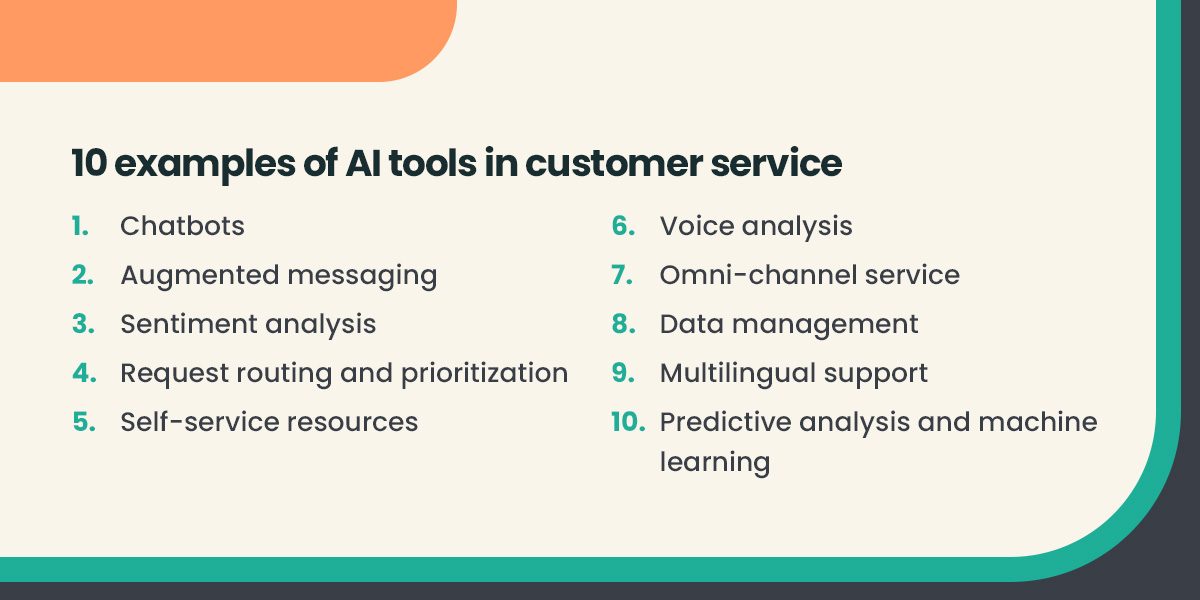-
Services
-
Locations
- Philippines
- United States
- Colombia
- Eastern Europe
Locations -
Industries
-
Resources
- E-Books
- Blog
- Case Studies
Resources - About Us
- Careers
Artificial intelligence (AI) has helped businesses worldwide increase productivity, become more efficient and deliver the best products and services to their customers. In particular, AI can be widely used in customer service. With the help of AI, customer service agents can resolve customer queries faster and provide quality assistance.
There are many ways in which you can incorporate AI into your customer service. From saving time to managing data, AI is a great resource for experienced agents and can help new employees better understand processes while providing quality assistance to all your customers.
What you need to know about AI in customer service
Did you know that 90% of American consumers use customer service as a factor to decide whether they’ll do business with a company? Therefore, creating an effective and memorable customer experience is vital — and the benefits of AI in customer service can make that process easier.
Thanks to tools like AI, customer service departments can connect customers to communication channels faster, streamlining processes and getting customers the answers they need promptly. Instead of keeping customers on hold, AI technology provides an alternative solution, such as chatbots and self-service resources. These abilities all work together to build a better customer service experience.
Still, customer service agents are much needed. AI in customer service doesn’t seek to replace agents — it’s an effective tool that gives agents accurate data and relevant solutions they can use to provide the best care and information. For example, AI can help answer basic, commonly asked questions, saving your agents time and allowing them to focus on more complex customer issues.
How AI can be used in customer experience
Take a look at a few of the ways you can potentially use AI for your customer service team.
Improve customer support workflows
Customer service agents manage countless customer calls and messages each day. Some queries can take a few minutes, while others are complex and require more time to solve. AI can help address the simpler customer questions, ensuring your customers get fast answers and your customer service agents can free up their workflows. When a query is complex or sensitive, AI will direct the question to an agent.
Create a more personalized customer experience
AI uses data to craft the most suitable responses for specific customer searches. It assesses the language and sentiment used by the customer to determine the best possible response. By using different kinds of information, AI can also make recommendations that will help agents address any situation or solve any query.
If a customer has interacted with the company before, AI can use data from the previous interaction to create a more personalized experience. When a customer service agent takes over, they’ll be able to see everything the AI recommended up until that point, so they have a clear idea of how to assist.
Manage high call volumes
Because AI can address simpler queries, customer service agents can manage more in-depth customer queries daily. If the AI can automatically address and offer solutions for simple customer questions, agents can better manage questions throughout the day by allocating questions in a more productive manner.

10 examples of AI tools in customer service
Whether you own a startup business or are a decision-maker for a large corporation, using AI can enhance customer experience through relevant, accurate responses in a timely manner. If you aren’t sure where to get started, here are 10 examples of artificial intelligence in customer service:
1. Chatbots
This is one of the most common forms of AI in customer service. A chatbot is configured to respond to simple comments and questions, which customers can use to get fast answers. For example, when a customer has a question about the company’s return policy, the chatbot can answer the question and provide a link to the return policy to assist. For complex queries, the chatbot can connect the customer to an agent.
2. Augmented messaging
Customer service agents can use augmented messaging to complete difficult tasks. The customer can start the interaction using a chatbot. If the chatbot notices the issue is complete, it will direct the query to the support agent. Once the support agent has helped the customer, they can divert the chat back to the chatbot to complete further steps.
3. Sentiment analysis
AI is a sophisticated resource that can determine a customer’s behavior. Natural language processing helps AI detect how a customer feels during an interaction. This helps the AI provide solutions using tones that will create a more positive customer experience. It will also direct the query to an agent if the customer’s sentiment requires a human perspective to address it.
4. Request routing and prioritization
AI takes agents’ experience into account, too. When it reroutes a customer to an agent, AI can choose a support agent that can best solve the customer’s query. For example, AI could redirect a customer with a question about billing to an agent in the relevant department.
5. Self-service resources
When you have content on your website that’s relevant to the customer’s query, you can configure your chatbot to direct customers to the most relevant page. This setup is highly effective when a customer asks a frequently asked question. In many cases, the customer can find the answer themselves at the link provided to them, and they don’t need to connect with an agent.
6. Voice analysis
Voice analysis AI answers customer calls. The voice AI will guide the customer by asking a series of questions to help guide them to the relevant agent. This way, your agents don’t have to answer each call initially, and customers can avoid bouncing between agents until someone qualified can answer their question.
7. Omni-channel service
If your customer support team is addressing a high volume of queries, AI can direct them to another channel of communication. AI will encourage users to either chat to the chatbot or send an email. This approach reduces the chance of a customer waiting on hold on a call.
8. Data management
AI has the ability to manage and process a large amount of data in a short amount of time, including data from your website and previous interactions with your customers. That same data can help AI and your team to provide the most suitable answers for customers.
9. Multilingual support
One of the many ways you can use AI to personalize customer experiences is by offering support in multiple languages. AI can translate questions for agents, allowing agents to communicate better with customers despite language barriers. AI can also reroute queries to agents who speak that specific language where possible.
10. Predictive analysis and machine learning
Along with managing and processing a vast amount of data, AI can analyze countless data types. It can create an algorithm that predicts customer behavior using the recommended action. As a result, your agents will have a better chance of addressing questions and concerns because they can use the recommended action with the best possible outcome.

Leverage technology and increase the quality of your customer service through outsourcing
At Peak Support, we can help you build a dedicated customer support team that can provide quick, thorough answers to customer questions and create a better overall customer experience. Whether you need assistance with emails, calls, chat messages or social media messages, our team can work to supplement yours by providing quality, personalized responses for customers.
Each of our agents has over eight years of experience, so you can trust that you’ll be paired with knowledgeable professionals in the field. Whether you’re interested in creating a customer service team or simply need help improving your existing department, Peak Support can offer the expertise you need to get there. Contact us today to get started.

